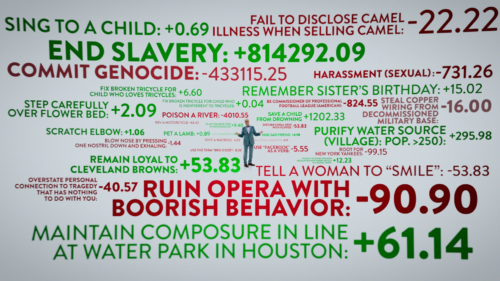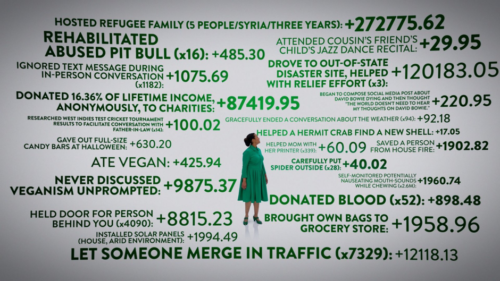With a nod to the tradition of New Year’s resolutions, this week, a philosophical experiment in “trying to be good.” It’s inspired by “The Good Place”, an imaginative comedy about the afterlife that features a myriad of philosophical problems.
r
A central premise of the show is that the positive and negative things you do in life contribute to a points total, and that only those with the highest of scores are able to enter “The Good Place”.
r
There’s a great clip of the “orientation video” shown to new arrivals here: https://www.youtube.com/watch?v=ut0ai4s4mjU
r
The Good Points Diary
r
Rather than getting into speculations about the existence of the afterlife or how it works, here’s a way to use the central premise of The Good Life to stimulate a rich enquiry, over the course of a couple of weeks. I would focus on just the “good points” rather than the “bad points” as I think it’s psychologically healthier!
r
Stage 1: Valuing your points
r
Introduce the idea, either through the excerpt or the photo (full size version of the photos can be found on our blog) or by generally discussing it. You needn’t even reference the afterlife – just the idea of evaluating how good a life you are leading on the basis of point scores for what you do. If you already use Class Dojo it’s just a matter of extending that to life beyond the classroom. (Other behaviour management/proto-authoritarian public shaming systems are available).
r
The first step is to get lots of different good actions each written on separate slips of paper (preferably scrap paper!). Perhaps twenty for a table of six. You can cross-fertilise ideas as they go. Then they could put similar ones together – which ones are good habits, which are kind to people, animals, good for the environment. Then they could rank them, and finally you could agree on a few example actions that would be worth 1, 10, 100, 1000 points and so on. You might also agree a name for this “currency” – “Shines”, “Halos” etc.
r
r
Stage 2: The Goodness Experiment
r
The next stage is for everyone to keep a private diary of the good things they do during the week, along with the points they would give themselves for them. Emphasise that nobody is going to have to share anything they record, though they can if they want to. It’s just to give them something to think about. At the end of each day, they should think back about what they have done during the day and list and give themselves points for the good things they have done. Here’s my example list for today:
r
1. Giving family member a lift back from getting car MOTed. +50
2. Not posting a snarky comment about Brexit on facebook. +100
3. Drafting this bulletin to send out to 17,000 teachers. +500
4. Talking patiently to a doctor at 3 a.m. about family member’s affliction with norovirus. +500
5. Having surge of socialist pride that it’s all on the NHS. +50
6. Raising a hand to apologise to someone I overtook in defiance of the highway code. +10
7. Stick to diet in evening despite temptations of Christmas food. +20
r
Stage 3: Reflection
r
Once everyone has been keeping their diary for a week (and adults should join in and be part of the experiment), start with the ground rules that nobody has to share anything specific about what they recorded, but that they are welcome to if they want to. You could ask people to write some examples of the good things they did and the points awarded onto slips of paper and then use them anonymously to draw up a list. The list you compile, and their reflections, will probably prompt questions. Looking at my list above, these spring to mind:
r
- Should you get points for things any decent person should do, or only for going above and beyond that? (1)
- Should you get points for choosing not to do bad things? (2, 7)
- Should you get points for things that are to your own benefit as well as for other people? (3)
- Should the goodness of an action be measured by how many people it helps, or by how much effort it is for you? (3 vs. 4)
- Should you get points for just feeling something rather than doing something? (5)
- Should you get points for apologising for bad things? (6)
- Should you get points for things that are good for you, but make no difference to other people? (7)
r
Other questions you could use
r
- How difficult was it to come up with a reasonable points score for actions that didn’t already have a value?
- Did knowing you were keeping score have any effect on what you did?
- Did keeping score have any effect on how you felt?
- If you started doing good things just to improve you score, should you still get the points?
- What if you believed in an afterlife and thought getting the points would determine what happened to you in the afterlife?
- If someone finds it hard to be good, should their points be adjusted up?
- If someone finds it easy to be good, should their points be adjusted down?
r
You might choose to keep the experiment running (expand it to families?), or there might be an opportunity for some interesting reflective writing. I’ll be interested to hear how it goes, so that I can share it with other superfans of The Good Place.
r
Best wishes,
r
Jason
r
PS. If you are interested in unlocking the power of storytelling for children’s talking, thinking and writing, I am launching a new strand to my work called “Storacy”. It combines elements of philosophy for children with techniques from other pedagogies to help children collaborate to create engaging stories through talk. I am looking for four UK pilot schools who would be interested in a half day (pupil workshops in the afternoon, plus twilight training) for the discounted fee of £399 + VAT – and I’ll still include the Philosophy Circles Primary Pack, which is £249+VAT by itself. Just press reply to ask for further details.

